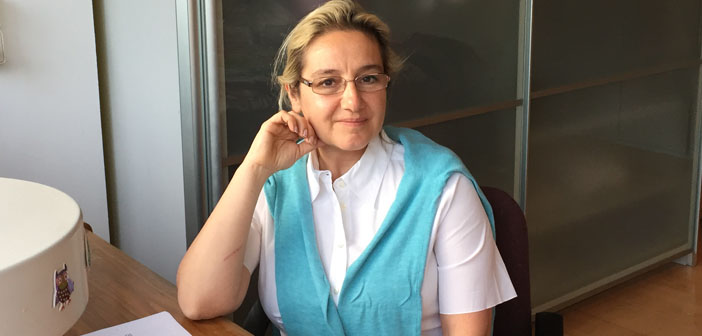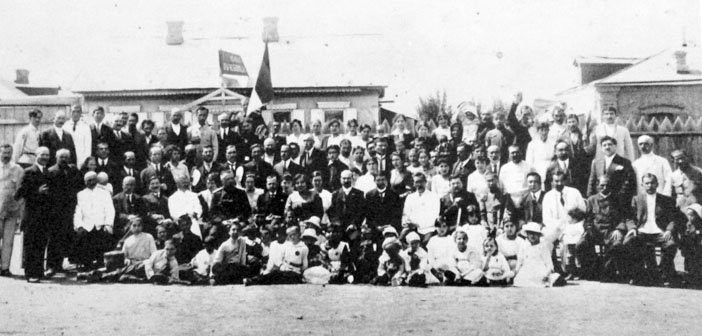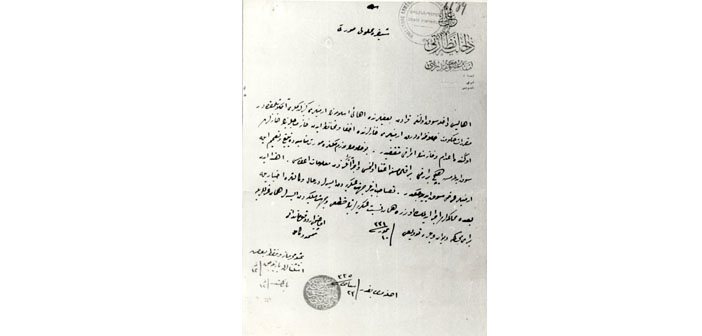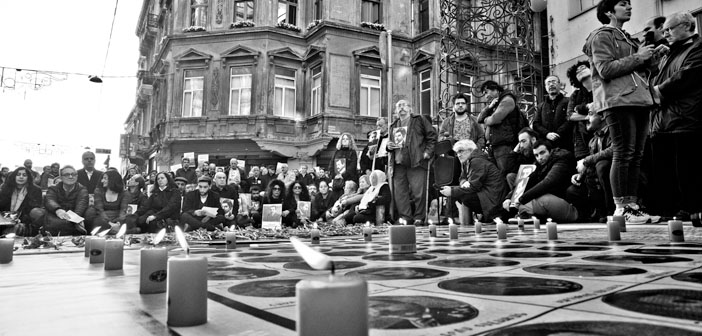Graduated from Köln University History Department, Sandy Zurikyan recently completed her thesis on East Germany and Armenian Genocide. We spoke to Zurikyan, who was also a former culture and arts editor of Agos, about the Armenian Genocide's repercussions in Eastern Germany.
The discussions that led to 1948 UN Genocide Convention reveals that Soviet Union considered genocide as a crime committed by Nazis, therefore by fascism, and tried to keep its distance from the concept of genocide. Was this also East Germany's view of genocide?
For East Germany, fascism wasn't the only factor to be blamed for genocide. “Monopolist capitalists”, “imperialists” and their “accomplices” and “the servants of the accomplices” are mentioned as the perpetrators in their texts, including academic articles.
In this respect, which events are characterized as genocide?
According to an encyclopedia published in East Germany in 1963, annihilation of Native Americans and some “black peoples” and killing of Jews, Poles and Czechs by Nazis is considered as genocide.
Though West Germany had rough edges during the post-Holocaust period, there were still important recognition efforts. How was official discourse on Holocaust shaped in East Germany?
East Germany believed that it sanctified itself from the sin of genocide by fighting with the Soviet Union against fascism. Studying the way Holocaust is treated in East Germany, Martin Broszat noted that, in “Zeitschrift für Geschichtsforschung" periodical issued by historians, Holocaust is mentioned only once between 1953 and 1972 in a literary research.
West Germany paid tributes to Israel and Will Brandt expressed apologies. How did East Germany reacted to those steps?
Contrary to West, this issue didn't resonate with East. For instance, Brandt's genuflection was ignored. Brandt's visit was covered by the 3 newspapers I examined, but none of them mentioned the apology. However, there was intense coverage about the prescription of the crime of genocide.
Was socialist Germany's stance concerning the Armenian Genocide parallel with its stance concerning Holocaust and the concept of genocide?
There are important parallels, but unlike Armenians, Jews were not marked as “accomplices to imperialism” and nobody was saying that they were subjected to genocide because of their own attitudes. In this respect, Turkish historical discourse is compatible with the East German discourse.
How was Armenian Genocide depicted?
I saw only one academic study on Armenian Genocide alone. There is no other. Genocide wasn't the main theme of Lepsius Symposium of Hermann Goltz either. It is for sure that Lepsius' life cannot be told without the genocide, but it wasn't the main theme. In the examples I covered in my research, the genocide is only mentioned while another topic is studied. Thus, there is no complete depiction of the genocide. There are such references in Lothar Rathmann's writings. When I reviewed the non-academic studies, I found out that Franz Werfel's “The Forty Days of Musa Dagh” had been a bestseller in East Germany for years and it was interesting. However, it is also curious that there wasn't a foreword in the book that has several editions. Formally, such a book needs a foreword. This novel is mentioned in Neue Deutsche Literatur literary magazine for many times, but the background events had never been mentioned. There is even an edition that introduces the book as the “legend of a people who fought for salvation heroically”, but not mentioning the name of that people.
Was East Germany's position about this issue parallel with Soviet Union's position?
East Germany wasn't an independent country which is capable of doing something that Soviet Union disapproves. However, East Germany developed a peculiar 3-staged-method for mentioning the Armenian Genocide. In the texts, we see that the genocide is noted first. In the second stage, Dashnaktsutyun, which had an attitude against Soviet Union for the independence of Armenia after the genocide, is negatively described. In those texts, Dashnaktsutyun is defined as if they damaged Armenians as much as genociders, or even more. In the last stage, Soviet Union is given credit for Armenians' salvation and independence of Armenia and this development is introduced as a great victory of socialism.
While there was a large Armenian population in Soviet Union, Armenians were marked as “bourgeois”. Wasn't it a position that could cause problems in internal politics?
It wasn't a problem for Soviets. Why would it be? Armenians constituted the centesmial of the whole population. Moreover, the government in Soviet Armenia and Armenians who had power in Duma were highlighting their identities as socialists and suppressing their national identities. I didn't search through Soviet archives; so, I don't know whether there was such a marking in Soviet texts, but this marking remained as a problem in internal politics of Armenia and became more apparent in the process of building a genocide monument.
What kind of a processes was it?
50th anniversary of the genocide was a turning point. Catholicos Vazgen I declared 1965 as the mourning year at the end of 1964. After that, we see a change in all the references to the genocide. Like in Samuel Beckett's plays, the weight of what is not spoken was felt. At the beginning of January, 55.000 copies of Franz Werfel's novel was published and sold out. This was a news for East Germany newspapers. However, hundred of thousands of people's pouring into the streets of Armenia and insisting on the monument wasn't a news material. On top of that, this monument was planned to take up 4500 square meters. In Soviet region, there wasn't any national monument as large as this one. Soviet officials didn't attended the opening ceremony of the monument that was held 2 years later. East Germany media didn't cover the event. Armenians organized worldwide commemoration events. Whereas many important international newspapers like Boston Globe, Washington Post, New York Times and Le Monde covered these event, East Germany newspapers didn't publish a single story. Yet, in the same year, prescription of the genocide was on the agenda. Both West and East Germany were discussing it. Armenian Genocide wasn't treated in that context.
Why did Soviet Union maintain this attitude toward the Armenian Genocide, though its relations with Turkey broke down after World War II?
Relations between Soviet Union and Turkey were sometimes good and sometimes distant. There was a tension especially after Turkey's NATO membership. However, at the 50th anniversary of the Armenian Genocide, the diplomatic ties between two countries were tightened again. For instance, they determined the Armenian-Turkish border without the participation of Armenia. The convergence between Soviet Union and Turkey was also reflected in East German media.
After 1965 or the emergence of ASALA, was there a change in this historical interpretation?
I reviewed 3 East German newspapers with the widest circulation: Neues Deutschland, which was a kind of Pravda; liberal Berliner Zeitung; and dissident Neue Zeit. None of them mentioned ASALA. There was only a brief information about Paris-Orly raid, but Armenian connection wasn't mentioned. First time in 1991, Neue Zeit published a story about an ASALA action in 1983 that was prevented by East Germany secret service. Hermann Goltz from Standpunkt periodical briefly mentioned ASALA actions. And that was it.





